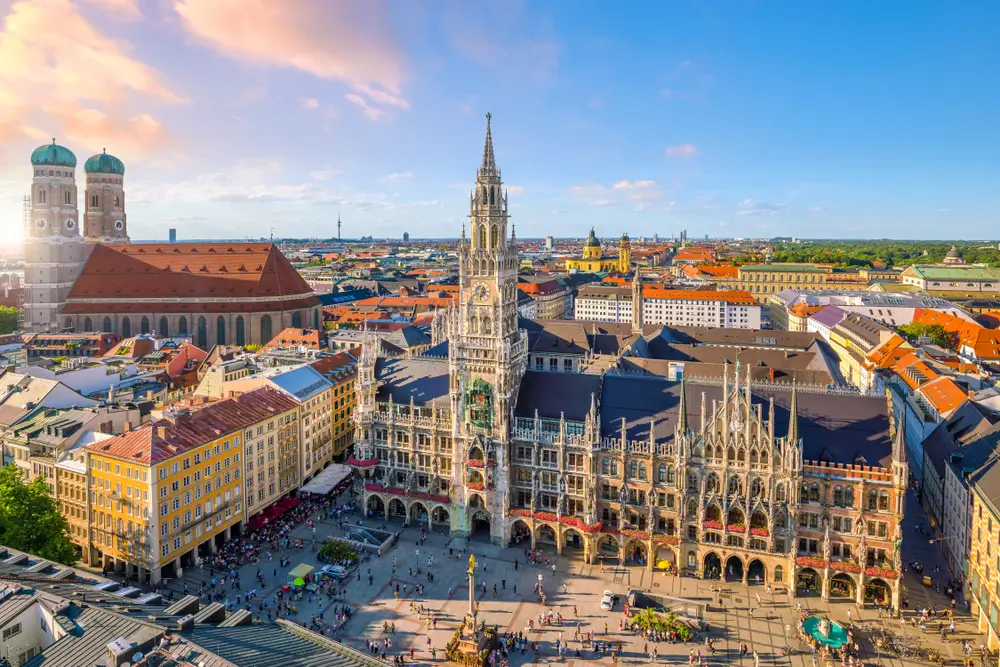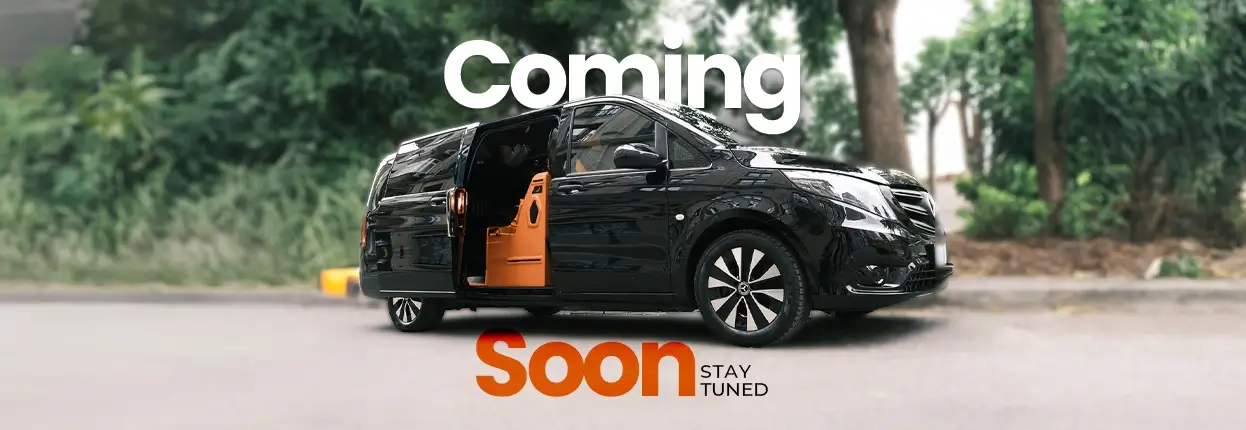Munich
Munich Şehir Rehberi

Munich, as the capital and largest city of the German state of Bavaria, stands out for its rich history, cultural heritage, and lively atmosphere. Munich, Germany's third-largest city, is renowned for its magnificent buildings featuring traditional Bavarian architecture, impressive art museums, and a vibrant beer culture. The city, which attracts millions of tourists every year, skillfully blends history and modernity. From beer festivals to art galleries, from parks to shopping streets, Munich is a treasure trove waiting to be discovered.
Things to Know Before Going to Munich
- Be mindful not to walk in the designated bike lanes.
- Plan your grocery shopping and meals ahead as many places are closed on Sundays.
- Carry cash or inquire about credit card acceptance before placing food and drink orders.
- Tipping is customary, usually rounding up to the nearest 1 or 5 Euro, depending on the bill and service level. If you prefer not to receive change, simply hand the waiter the money and say "Stimmt so."
- Tap water is safe to drink, but in restaurants, it's typically not complimentary. Specify your preference for still or sparkling water when ordering.
- Use ATMs located in front of banks to withdraw cash and avoid "Euronext" ATMs in touristy areas, which may charge higher fees.
- Munich's weather can be unpredictable, so pack accordingly, including a warm layer to wear under a raincoat in case of rain.
- If someone corrects your actions, don't interpret it as a personal attack.
- Making an effort to speak German is appreciated by locals; don't fret about your accent.
- Sarcasm and irony may be perceived differently; be mindful of cultural nuances.
- Some individuals are exceedingly friendly, while others may seem rude. Don't dwell on negative interactions, as motivations can vary.
- Curling ("Eisstockschießen") is a fun winter activity in Munich, especially for groups or those open to joining others.
Where is Munich?
Munich is located in southern Germany and serves as the capital city of the state of Bavaria. It lies about 30 miles (50 km) north of the edge of the Alps and along the Isar River.
Where to Stay in Munich?
Here’s a quick table of which areas in Munich are great for tourists:
District | Best For | Best Attractions | Average Trip Cost |
|---|---|---|---|
| Altstadt-Lehel | History Culture Nightlife | Marienplatz Residenz Viktualienmarkt | €50-€100 per night |
| Maxvorstadt | Artistic Hub Cultural Experiences | Museums Galleries Beer Gardens | €40-€80 per night |
| Schwabing | Bohemian Vibe Nightlife | Art Nouveau Buildings Englischer Garten | €30-€60 per night |
| Glockenbachviertel | Trendy LGBT-Friendly | Nightlife Bars Clubs | €40-€80 per night |
| Haidhausen | Tranquil Picturesque | Parks Gardens Quiet Atmosphere | €30-€60 per night |
Best Hotels in Munich
Munich hotels offer a blend of luxury and convenience, providing exceptional services and amenities for your trip to be more comfortable. Even though luxury hotels in Munich may make you break the bank, they will be worth every penny thanks to their services. However, there are always mid-range and budget hotels in Munich to enhance your days and make your city tour seamless. Tailored for everyone, finding what kind of accommodation you want won’t be hard as you think. Now, here are some of the best hotels in Munich we recommend and why:
| Hotel | District | Affordability | Why To Stay There? |
|---|---|---|---|
| WunderLocke | Munich City Centre | Moderate | Unique design, modern amenities, and a lively atmosphere |
| Platzl | Munich City Centre | Moderate | Historic building, comfortable rooms, and a central location |
| Hotel Cristal München | Munich City Centre | High | Luxurious rooms, excellent service, and a prime location |
| Hilton Munich Airport | Munich Airport | High | Convenient location, modern amenities, and a comfortable stay |
| Concept Living Munich Serviced Apartments | Munich City Centre | Moderate | Spacious apartments, fully equipped kitchens, and a central location |
Find best hotels in Munich here!
Best Munich Attractions
Here are some of the best attractions to visit in Munich:
- Viktualienmarkt: A historic food market known for its fresh regional produce, including bread, speck, and Schweinshaxe. It also hosts a Christmas market during late November and December.
- Marienplatz: The geographical and cultural heart of Munich since 1158, featuring important buildings like the Old and New Town Halls.
- Neuschwanstein Castle: A fairytale palace surrounded by stunning scenery, located near Munich and a must-visit for its history and architecture.
- Deutsches Museum: The largest museum of science and technology in the world, with an enormous collection of objects across 50 different fields.
- Hofbräuhaus: Munich's most popular beer hall and one of the most famous in the world, with a history dating back to 1589.
- BMW Welt: An exhibition centre, museum, and event venue dedicated to all things BMW, Bavaria's most visited tourist attraction.
- Englischer Garten: One of the largest urban parks in the world, covering over 21 acres and offering a peaceful escape from the city.
- Residenz: The official residence of the Bavarian royals between 1508 and 1918, the largest city palace in Germany.
- Frauenkirche (Cathedral): A magnificent cathedral in the city centre, known for its striking architecture and historical significance.
- Odeonsplatz: A large square in the north of Munich's Altstadt, featuring several of the city's most emblematic monuments.
Is Munich Safe for Tourists?
Munich is perfectly safe for tourists. The Bavarian capital has one of the lowest crime rates in Germany, so walking around the city as a tourist shouldn't be of any concern.
Is Munich Expensive to Visit?
Munich, the capital of Bavaria, Germany, is considered one of the most expensive cities in Germany to visit. However, with careful planning of your budget, it is possible to travel on a budget.
Currency & Exchange in Munich
The official currency of Germany is Euro. The best exchange options in Munich are local banks, online forex platforms, credit cards with no foreign transaction fees, ATMs, and forex cards.
Spoken Languages in Munich
The official language of Munich, Germany is German, but English is widely understood and spoken, especially in tourist areas and among younger people.
How Many Days Are Enough to Visit Munich?
Three or four days are generally considered enough to visit Munich and see the most important attractions. However, if you want to experience the full range of Munich's attractions and activities, including day trips to other cities like Salzburg and Regensburg, five days or more would be ideal.
What to Do in Munich?
- Explore the Olympiapark: Visit the scenic Olympiapark, built for the 1972 Summer Olympics. Stroll through the beautiful landscapes, take a tour over the tent roof of the Olympic Stadium at a height of 40 meters, and enjoy the views of the city and the Alps.
- Surf the Eisbach River Wave: Experience the thrill of surfing on the artificial wave in the Eisbach River, located in the English Garden. Watch skilled surfers ride the wave or take a lesson yourself.
- Visit the BMW Museum: Explore the history and technology of BMW at this state-of-the-art museum. See a collection of vintage and modern BMW vehicles and learn about the company's innovations.
- Dine at Hofbräuhaus: Enjoy traditional Bavarian cuisine and beer at the famous Hofbräuhaus, one of the oldest and most popular beer halls in Munich.
- Take a Bike Tour: Discover the city on a bike tour, exploring hard-to-reach lanes and seeing major attractions like Marienplatz, Viktualienmarkt, and Karlsplatz.
- Explore the English Garden: Wander through one of the world's largest urban public parks, the English Garden. Visit the Japanese Teahouse, relax in a beer garden, or watch surfers on the Eisbach River wave.
- Visit the Munich Residence: Tour the former royal palace, the largest city palace in Germany. Admire the opulent architecture and explore the beautiful gardens.
- Attend a Performance at the Bavarian State Opera: Experience world-class opera and ballet performances at the Bavarian State Opera, one of the most prestigious opera houses in the world.
- Indulge in Local Cuisine and Beer: Sample traditional Bavarian dishes like Weisswurst, Brezn, and Weissbier, and explore the city's many beer gardens and breweries.
When is the Best Time to Stay in Munich?
Spring and autumn are the best times to visit Munich, Germany, as the weather is mild, there are fewer crowds, and a variety of festivals take place.
| Summer | Spring | Fall | Winter | |
| Temperature (°C/°F) | 26-25°C (79-77°F) | 8-18°C (46-64°F) | 8-18°C (46-64°F) | 7-0°C (45-32°F) |
| Activities | Outdoor swimming, beer gardens, festivals | Outdoor activities, festivals, blooming gardens | Oktoberfest, outdoor activities, foliage | Christmas markets, skiing, winter sports |
| Rates | Higher | Moderate | Moderate | Lower |
| Crowd | Peak tourist season | Fewer crowds | Fewer crowds | Fewer crowds |
| Clothing | Lightweight clothing | Lightweight clothing | Lightweight clothing | Warm clothing |
What to Pack for Munich Trip?
Spring (March to May)
- Lightweight clothing like T-shirts and blouses
- Cardigan or sweater for cooler mornings and evenings
- Comfortable walking shoes
- Scarves and hats for added warmth
- Umbrella for potential rain showers
- Toiletries and other essentials
Summer (June to August)
- Lightweight clothing like t-shirts and shorts
- Comfortable walking shoes
- Sunglasses and sun hat for outdoor activities
- Water bottle for staying hydrated
- Power adapter/converter for charging devices
- Toiletries and other essentials
Fall (September to November)
- Lightweight clothing like T-shirts and blouses
- Cardigan or sweater for cooler mornings and evenings
- Comfortable walking shoes
- Scarves and hats for added warmth
- Umbrella for potential rain showers
- Toiletries and other essentials
Winter (December to February)
- Warm clothing like sweaters and fleeces
- Comfortable walking shoes with good grip for icy streets
- Scarves and hats for added warmth
- Gloves and earmuffs for extreme cold
- Umbrella for potential snow showers
- Toiletries and other essentials
What to Eat in Munich?
Here are the must-eat dishes from Munich:
- Munich White Sausage: One of the most iconic meals in Munich, it is made of a mix of veal, pork, and spices.
- Bavarian Leberkäse (Liver Meatloaf): It is a bread where the flour is swapped out for a protein mix of beef, pork, water, and salt.
- Leberknödelsuppe (Liver Dumpling Soup): This traditional soup is a staple served in many Bavarian restaurants. The dumplings are made of liver and flour, shaped like spaetzle.
- Munich Schnitzel: Traditional German schnitzel is breaded and fried veal or pork served with spaetzle, potatoes, cucumber salad, or fries.
- Bavarian Donuts: They are deep-fried, covered in sugar, and stuffed with fruity jam or vanilla cream.
- Beer: Drinking beer is a way of life in Munich. Beer is generally considered a staple food and is fondly known as liquid bread.
Munich Nightlife
Here are the best nightlife spots in Munich:
- P1 Club: Known for its exclusive atmosphere and strict dress code, this club is a popular spot for the city's elite.
- Harry Klein: A mecca for electro fans, this club offers a high-energy techno scene with a first-class sound system.
- Ruby: A popular spot for R'n'B, hip-hop, and chart music, with a "Pay one, drink two" offer on Fridays.
- BACKSTAGE: A cultural and event center that hosts a variety of music genres, including heavy metal, reggae, and electronic music.
- Glockenbachviertel: A trendy neighborhood with a mix of bars, clubs, and restaurants, known for its lively nightlife.
- Muffatwerk: A cultural and event center that hosts concerts, parties, and festivals, with a focus on alternative and indie music.
- Crux: A club that offers a mix of electronic and indie music, with a focus on local and up-and-coming artists.
- Munich MMA: A club that hosts MMA events and parties, with a focus on the city's martial arts and fitness scene.

